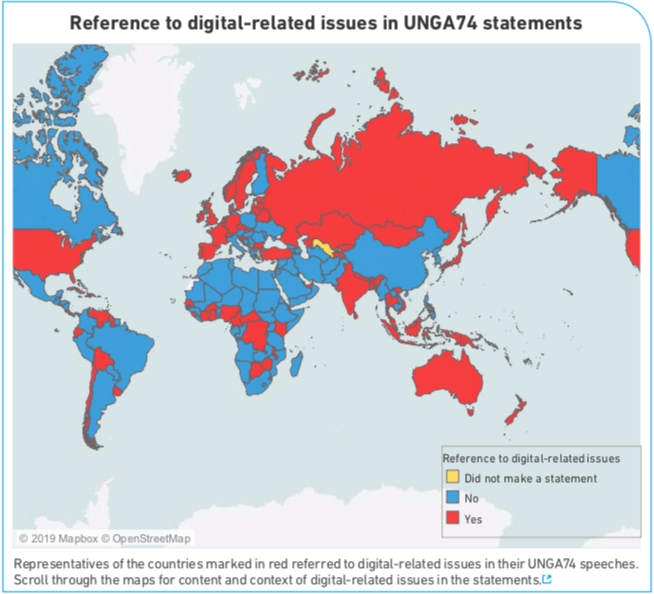Digital Watch newsletter – Issue 43 – September 2019
Trends
Every month, we analyse hundreds of developments to identify the trends in digital policy, and the unfolding issues that drive it forward. These are the key trends that sum up the month.
1. Future of work: Mixed rules for gig workers
In the past few years, the growth of the sharing economy has brought with it many debates, mainly due to its unprecedented business model. One question, related mostly to ride-hailing businesses such as Uber and Lyft, seems to resurface regularly: Are drivers considered employees or independent contractors? This debate gained a new dimension in the USA in September, after the state of California enacted Assembly Bill 5 (A.B.5).
This bill codifies a ruling issued in 2018 by the Supreme Court of California, which applied the so-called ABC test for determining whether gig workers can be considered independent contractors.
So what does the bill say? A worker is considered an employee by default, unless the hiring entity demonstrates that three conditions are met simultaneously: (a) the person is free from the control and direction of his/her employer in connection with the performance of the work; (b) the person performs work that is outside the usual course of the business of the employer; (c) the person typically works with other businesses (or independently), of the same nature.
The new bill presents challenges for ride-hailing companies, and it is no surprise that they advocated against it. If the ABC test is not met, drivers have to be granted employment rights, including minimum wage, paid time off, and sick leave. This would mean increased costs for companies (of up to 30%), which are expected to be reflected in higher tariffs for clients.
The implications for drivers can be looked at from two perspectives. On the one hand, the new law would limit the drivers’ ability to work independently. Uber argues, for example, that there is a clear demand for flexible work, and that online platforms offer workers new opportunities to make money. On the other hand, the bill is good news for those drivers who have been complaining about their limited rights and have asked to be classified as employees.
The bill will enter into force on 1 January 2020. But Uber does not plan to automatically reclassify its drivers as employees in California. Uber argues that its drivers will pass the ABC test. The company is also ready to dispute in court any legal challenges related to the status of its workers.
The ‘employee vs contractor’ issue is a matter of interest not only in California. In Brazil – which is Uber’s second largest market after the USA – the Superior Court of Justice ruled that drivers are independent contractors, as they have flexible work time and the freedom to manage their rides. The decision is a win for ride-hailing companies, which can retain their status quo.
California’s new bill and the Brazil court ruling add to the growing legal patchwork of different rules concerning the status of gig workers. Now, drivers of the same ride-hailing company are treated differently depending on where they are based. This means legal uncertainty for both companies and drivers.
2. A threat to consumers? Libra facing opposition
Over the past month, Facebook’s cryptocurrency Libra has attracted growing opposition from public authorities. They are worried that the currency could be risky for consumers and pose challenges for countries’ financial stability and monetary sovereignty.
France, for example, is concerned that Libra might undermine the sovereignty of the euro and other fiat currencies. According to finance minister Bruno Le Maire, the country intends to halt the development of Libra in Europe.
France’s concerns are also shared by Germany, as reflected in a joint statement issued by Le Maire and German finance minister Olaf Scholz. Virtual currencies can pose serious risks to consumers, to financial stability, and even to the monetary sovereignty of European states, the two ministers note. ‘France and Germany consider that the Libra project [...] fails to convince that those risks will be properly addressed.’ As an alternative, they are encouraging ‘European central banks to accelerate work on issues around possible public digital currency solutions’.
In what the Financial Times described as ‘the first major encounter between Libra’s founders and policymakers’ since the announcement of the cryptocurrency, the Libra Association faced questions during a Bank for International Settlement (BIS) meeting in mid-September, attended by representatives of 26 central banks. In a press release following the meeting, Benoît Cœuré, who chairs the BIS Committee on Payments and Market Infrastructure, said that ‘the bar for regulatory approval [for stablecoins] will be high’, as they pose ‘serious risks related to public policy priority’. Stablecoins are cryptocurrencies backed by other assets or other currencies, and therefore stable in price.
Faced with increasing scrutiny, the Libra Association seems committed to working with authorities to ‘achieve a safe, transparent, and consumer-focused implementation’. The Association also says that hearings and discussions are welcome, as they steer the direction in which regulatory frameworks for cryptocurrencies are to be developed.
So, what comes next? As more and more financial bodies explore the implications of Libra, its future is still uncertain. The report of the G7 Working group on stablecoins, which is expected to be presented by mid-October, may also offer interesting insights into Libra.
3. New digital ID programmes to be rolled out
Around the world, many digital identity programmes are taking off. The following developments caught our eye.
Malaysian authorities are working on a national digital ID system which will allow citizens to use a unique digital ID to access online services and conduct digital transactions safely and smoothly. Singapore is also rolling out a national digital identity programme: citizens and residents will be issued crypto-based mobile digital identities to be used in public and private sector transactions for identification, authorisation, signature, and similar purposes.
In Ireland, the city of Dublin is preparing the groundwork for a digital ID initiative which, among others, will facilitate citizens’ access to certain public and private services. Authorities in the Catalan region of Spain are also implementing a decentralised digital ID project, based on an IdentiCAT application which uses blockchain technology and distributed ledgers.
Most of the existing and planned digital ID programmes rely on mobile phone applications, thus reflecting a focus on accessibility and mobility, while also capitalisting on the fact that mobile phones with data plans are increasingly popular. Many digital IDs also involve the use of blockchain, demonstrating that the technology has more and more applications.
But beyond the employed technologies and the expected benefits, digital ID systems have one more thing in common. As they all involve the collection and processing of personal data, they need to demonstrate that adequate safeguards are in place to ensure data security and privacy.
We can expect more developments in the area of digital ID systems in the coming months, as new programmes are launched and ongoing programmes progress. If security and privacy considerations and properly addressed, digital IDs hold much promise. They can bring more interconnectedness, facilitate financial inclusion, and contribute to achieving the main goal of the sustainable development goals (SDGs): ‘leave no one behind’.
Digital policy developments
With so many developments taking place every week, the policy environment is chock-full of new initiatives, evolving regulatory frameworks, new court cases and judgments, and a rich geo-political environment.
Through the Digital Watch observatory, we decode, contextualise, and analyse these issues, and present them in digestible formats. The monthly barometer tracks and compares them to reveal new focal trends and to determine the presence of new issues in comparison to the previous month. The following is a summarised version; read more about each one by following the blue icons, or by visiting the Updates section on the observatory.
Global IG architecture
increasing relevance
Heads of state convened in New York for the UN General Assembly’s General Debate, as part of the 74th session. Technology featured prominently in the debates. Benefits were lauded, while new challenges were raised.
Sustainable development
same relevance
According to the International Telecommunication Union (ITU) Digital Skills Insights 2019, capacity building is critical for the achievement of all SDGs.
The Africa E-commerce Agenda, released by the International Trade Centre and the World Economic Forum, noted that e-commerce can become the driving force behind sustainable development in Africa.
The 2019 Digital Economy Report published by the UN Conference on Trade and Development drew attention to the widening digital divides that threaten to leave developing countries even further behind.
Security
increasing relevance
The Open-Ended Working Group (OEWG) on developments in the field of ICTs in the context of international security held its first substantive session. Read our session reports
A massive Distributed Denial of Service (DDos) affected Wikipedia, taking the platform offline in several parts of the world. A major data breach exposed personal information of more than 20 million Ecuadorians. Microsoft released an emergency patch to fix critical vulnerabilities impacting Internet Explorer.
A poll conducted by the UN Children's Fund (UNICEF) in 30 countries indicates that one in three young people has been a victim of online bullying.
E-commerce and Internet economy
increasing relevance
According to the European Commissioner for Competition, the EU may need more rules to govern the collection and use of data by Internet companies.
In the USA, a bipartisan coalition of attorneys general has launched an investigation into Google over potential anti-competitive behaviour. A French court imposed a €4 million fine on Amazon over abusive contractual clauses for retailers. Google agreed on a nearly €1 billion settlement with French tax authorities.
Facebook’s cryptocurrency Libra has been facing opposition from financial institutions, including in France and Germany.
California enacted new legislation giving more rights to gig workers. Brazil’s Superior Court of Justice ruled that Uber drivers are independent contractors.
Digital rights
increasing relevance
The US Federal Trade Commission fined YouTube for violating children’s privacy rights. The EU-US Privacy Shield passed its third annual review.
In an open letter to US Congress, CEOs of over 50 tech companies asked for the adoption of federal legislation on data privacy.
Bangladesh has ordered telecom companies to block mobile phone access throughout Rohingya camps.
Jurisdiction and legal issues
same relevance
In a case opposing France and Google, the Court of Justice of the European Union (CJEU) ruled that the EU’s right to be forgotten does not apply globally. The CJEU’s Advocate General opined that copyright is not exhausted when it comes to the re-sale of e-books.
Internet intellectual property disputes made up 80% of cases at the Beijing Internet Court during its first year of existence.
Infrastructure
same relevance
China has started developing 5G standards for hospitals and medical institutions.
Belarus adopted new rules making it mandatory for Internet providers to support Internet protocol version 6 (IPv6).
The Internet Corporation for Assigned Names and Numbers (ICANN) installed an ICANN Managed Root Server instance in China.
Net neutrality
decreasing relevance
Australia’s national broadband network operator has dropped plans to tax video streaming services differently from other traffic.
New technologies (IoT, AI, etc.)
same relevance
At least 75 countries use AI for surveillance purposes, report finds. China plans to oblige online services to make sure that the algorithms they use promote 'mainstream values'. The US Air Force released an AI strategy.
A UK court ruled that the use of automatic facial recognition technology (FRT) by the police is lawful. The Moroccan data protection authority announced a temporary ban on FRT use. Facebook introduced changes to its face recognition tools, giving users more control.
Germany has released a national blockchain strategy. The UAE Ministry of Health is developing a blockchain-based system to share assessment information of health professionals.
Developments
Many policy discussions take place in Geneva every month. The following updates cover the main events of the month. For event reports, visit the Past Events section on the GIP Digital Watch observatory.
Digital Cooperation: Can Geneva make it a win-win? | 2 September 2019
The conference discussed Geneva’s rich past of finding solutions to problems caused by new technologies, and technology’s impact on human life. Speakers noted that today’s cyber-conflicts and the latest technological developments contribute to creating new types of warfare and require the development of new legal instruments. Speakers also referred to the new Swiss Digital Initiative, which will encourage discussions among actors and expand on existing principles and ethical behaviour in cyberspace. Discussions also highlighted the need to move away from the concept of ‘owning data’ to adopting an understanding of ‘using data’, and to look for win-win solutions where data can be used and exchanged rather than owned. Read our reports from the conference.
Digital Day Geneva | 3 September 2019
Organised as part of the 3rd Swiss National Digital Day, actors from the public and private sectors and academia discussed the impact of new technologies on our daily lives and how we can prepare our workforce for upcoming changes. Participants also discussed new ways of teaching younger generations about technology and ways of providing them with future-proof education given the fast developments in technology.
Privacy in the digital age | 12 September 2019
The discussion on privacy in the digital age, organised as a side-event during the 42nd Human Rights Council (9–27 September 2019), addressed the opportunities and challenges that new technologies, including AI systems, bring to the right to privacy and the protection of civic space. This was in the light of a draft which Germany and Brazil presented during the Council on protecting human rights online. Discussing transparency and accountability of digital identity systems, surveillance systems, and facial recognition technology, speakers agreed that although there is no one-size-fits-all solution, the regulation of such technologies should be firmly grounded in the existing human rights framework. It should also follow the principles of necessity and proportionality, while keeping in mind other privacy and security concerns.
Geneva and the future of multilateralism | 16 September 2019
The event, which celebrated the centenary of the League of Nations, focused on the current challenges that multilateralism is facing. The multilateral system, which some speakers believe is a key political process for addressing today’s challenges and finding global solutions, is transitioning and must be adjusted to the reality of today. One of the suggestions which emerged from the discussion was a rethink of the entire co-operation system in which public-private partnerships would have to take on more responsibilities due to the current transfer of power towards the private sector. Read our reports from the sessions.
Big tech companies: How big is too big?
Events of the past few months have demonstrated the increased interest of antitrust authorities in the USA, the EU, Australia, South Korea, Japan, and others, in large tech companies. The main question these authorities are asking is: Are big companies misusing their dominant position in the market, and how do we stop this?
Four tech companies – Amazon, Apple, Google, and Facebook – are at the centre of this scrutiny. In addition to its size, current market share, and aggressive expansion patterns, each of these companies has triggered a specific issue with antitrust authorities with regard to their market dominance.
Amazon’s access to huge amounts of consumer data
Amazon is the most popular ecommerce website in the world. It reaches 1.2 billion customers, owns almost half of the public cloud market infrastructure, and is expanding to brick-and-mortar retail as shown by the acquisition of the Whole Foods supermarket chain in the USA.
The main concern for antitrust authorities is that Amazon improperly favours its own products to those of third party sellers. EU competition officials recently opened an investigation into Amazon’s position as both an online marketplace and a digital seller. The EU is looking into whether Amazon may be using sensitive sales data gathered from other retailers on its platform to boost its own activities and, in doing so, preferentially advertising its own products. In the USA, the House of Representatives’ Antitrust Panel is asking Amazon the same questions as part of its investigation into possible competition abuses.
Apple’s influence over its AppStore
For Apple, the main area of investigation for the antitrust authorities relates to the company’s AppStore and the control Apple exerts over it. On the side of the app providers, Spotifyhas submitted a separate competition complaint in the EU against Apple for giving preferential treatment to its own music streaming services. One of their main complaints is that Apple charges a 30% tax on app providers through their in-app payment system. This same issue is being investigated by the US Department of Justice and the Dutch competition authority.
Similar complaints have been filed by the providers of parental control apps in the EU, Russia, and the USA. In a related matter, the US Supreme Court recently ruled that consumerscould file class-action lawsuits against Apple for artificially inflating the prices of apps.
Google’s practices in online searches and advertising
Google is subject to antitrust investigations because of its monopoly in the search market; it controls on average 90% of searches globally. The Federal Trade Commission (FTC) investigated Google for favouring its own search results, but concluded that this practice resulted in no harm to consumers. In 2017, European antitrust officialsfined Google €2.4 billion for favouring its shopping service over competitors in search results.
Google is also dominant in the digital advertising sector, which happens to be its largest source of revenue. Google sells the most digital ads and is one of the biggest providers of the related analytics. In this way, according to its competitors, Google exerts control over the market and forces companies to use its technology and purchase advertisements through Google. The European Commission has agreed with such assessments and fined Google €1.49 billion for abusive practices in its online advertising.
Another area where Google has a dominant position is its Android software currently used by at least three-quarters of the world’s smartphones. Google is using this position to increase its dominance in the search market by requiring phone manufacturers to place its search engine prominently on their phones and preinstall a series of Google apps. Since the phone manufacturers are forced to use Android software (it is the only available software that hosts apps users demand), Google is in a position to force unfair terms on the phone manufacturers. For these illegal practices, the European Commission fined Google €4,34 billion.
Facebook’s quest for more acquisitions
With 2.2 billion regular monthly users worldwide, and a social media market share reaching 70% globally, Facebook is actively pursuing acquisitions to maintain its lead for years to come. With efforts to expand into the financial sector through its cryptocurrency Libra, and plans to launch new streaming platforms this October, Facebook has been in the crosshairs of the antitrust authorities for quite some time.
Following an FTC investigation into Facebook’s privacy practices, the FTC fined Facebook $5 billion and imposed stricter oversight on the company. At the same time, the FTC also announced that it is investigating Facebook for acquisitions of more than 70 companies, apps, and start-ups over the last 15 years, including the purchase of Instagram in 2012 for $1 billion, and WhatsApp in 2014 for $19 billion.
Antitrust proceedings in the USA
Even though the fines imposed for violations of antitrust rules for Amazon, Apple, Google, and Facebook are high, they are not considered effective enough by authorities such as the FTC. One reason is that US antitrust laws require actual harm to the consumer for conduct to be considered harmful, which is difficult to prove in the digital market.
This past summer, however, after mounting public pressure to investigate Big Tech for anti-competitive conduct, the US federal government stepped up its efforts. The FTC and the Department of Justice Antitrust Division have opened investigations into Big Tech and divided oversight of them with the FTC taking over Amazon and Facebook, and the DOJ overseeing Google and Apple. Separately, the Judiciary Committee of the US House of Representatives has launched a bipartisan ‘top-to-bottom’ antitrust probe of these four companies and has formally requested documents, including all CEO email correspondence going back several years.
At state level, attorneys general from 48 US states, the District of Columbia, and Puerto Rico have formally opened an antitrust probe into Big Tech. Google is being investigated for its advertising practices, with indications that the scope of the probe may be expanded. Facebook is being investigated for its acquisition practices, endangering consumer data, reducing the quality of consumer choice and/or increasing the price of advertising.
These investigations are at their early stages and are expected to last several years. Their critics point out that the slow pace will make the investigations obsolete since Big Tech will change the way they operate long before the authorities can build a case against them.
Antitrust proceedings in the EU
The European Commission has also been proactive in implementing antitrust regulations against Big Tech and altering their conduct within the EU.
The EU Commissioner for Competition Policy, Margrethe Vestager, is expected to be confirmed for an unprecedented second term on 1 November. Vestager will additionally oversee EU digital policy by taking on the position of Executive Vice-President, in charge of a portfolio called Europe fit for the Digital Age, giving her a wider scope of power and manoeuvering space in her work with Big Tech.
A matter of time
One thing that can be said with certainty is that antitrust authorities and regulations will have to adapt to effectively protect customers as Big Tech continues to defend and expand its share in the global digital market. Time is not on their side.
Tech issues during UNGA74: More is less...
In September, national delegations took the stage at the UN Headquarters in New York for the annual UN General Assembly debate. On their agendas were pressing global concerns, such as how to address poverty reduction, violent conflicts, and the climate crisis. Tech-related issues also made a strong appearance.
In the past few years, digital issues have risen steadily in priority during the General Debate. From only a handful of references to digital technology, world leaders are now acknowledging technology’s potential to attain the ambitious Agenda 2030 and to improve human life. At the same time, they are concerned about the misuse of technology.
This year, the six-day debate (24–30 September) saw technology-related topics being addressed in a higher number of statements compared to previous years (see our coverage of UNGA73 and UNGA72 ). Over a third of all national statements (84) referred to ICTs, which is an increase of 33.3% over last year’s 63 references and 79% compared to a total of 47 mentions in 2017. European countries accounted for over a third (30) of statements that tackled ICTs, followed by the Asia-Pacific region (24) and Africa (16).
And yet, curiously, this year's statements were mostly based on general phrases and proclamations. New insights and concrete proposals were missing. The trend towards vagueness definitely increased compared to the previous year.
The most prominent digital issues at UNGA74
The majority of speeches – mostly by representatives of developing countries – emphasised the impact of digital technologies on sustainable development (41). Their positive contribution in sectors such as healthcare and agriculture was emphasised by representatives of Djibouti and Ghana. That said, half of these 41 statements addressed the other side of the coin, highlighting the widening digital divide between the developing and developed world as one of the most pressing challenges of the digital transformation.
With regard to the application of innovative digital technologies in education systems, particular attention was given to e-learning and improving the quality of education.
More than a quarter of national delegations (24 speeches) expressed concern over cybersecurity, including the weaponisation of digital technology (10 of the speeches). The majority (14 speeches) came from Europe. In contrast, only 2 out of 54 African nations (Mauritius and Burkina Faso) and 1 out of 12 Latin American nations (Trinidad and Tobago) referred to matters of cybersecurity. Estonia referred to cyberspace as a new military domain, while Mauritius and the Holy See expressed concern about the militarisation of cyberspace. Seven countries acknowledged the threat cybercrime poses to security and underlined the transnational nature of the threat.
The trade rift between the USA and China was tackled by UN Secretary-General António Guterres. He warned that ‘the world's splitting in two, with the two largest economies on Earth creating two separate and competing worlds, each with their own dominant currency, trade, and financial rules, their own Internet and artificial intelligence capacities and their own zero-sum geopolitical and military strategies.’
With regard to online violent extremism and terrorism, the Prime Minister of New Zealand noted that, four months after the launch of the Christchurch Call, a review was conducted on the progress made. The Global Internet Forum to Counter Terrorism (GIFCT) – an industry-led effort to disrupt terrorist abuse of members’ digital platforms – will become an independent body that will drive the tech sector’s work on implementing the Call. In addition, the crisis response protocol established on 24 September will coordinate and manage action between governments and tech companies on tackling the online impact of a terrorist attack in the future. In their statements to the UNGA, Senegal reiterated its support for the Christchurch Call, while Tajikistan, Norway, and Brunei Darussalam expressed concern about the spread of extremist and terrorist content on the Internet.
This year, fewer statements referred to digital technologies and human rights, which is a declining trend compared to previous years. Out of 11 speeches, nearly half of them referred to privacy and data protection whereas the other half covered topics such as freedom of expression and gender rights online.
Next year, the UN will celebrate its 75th anniversary with a meeting dedicated to reaffirming collective commitment to multilateralism. It remains to be seen whether digital technology will be a part of ‘the future we want, the UN we need’.
For a detailed analysis of digital aspects during the 74th session of the UNGA and other organisations, consult the study on the Digital Watch observatory. For other policy issues, read the article ‘Business as usual at the 74th UNGA’.






